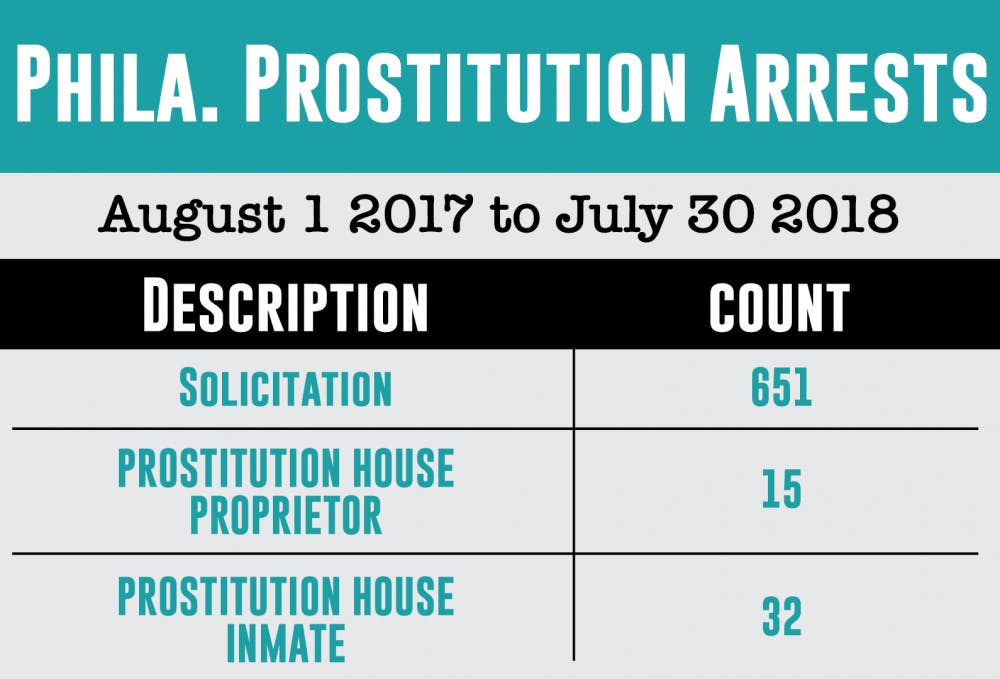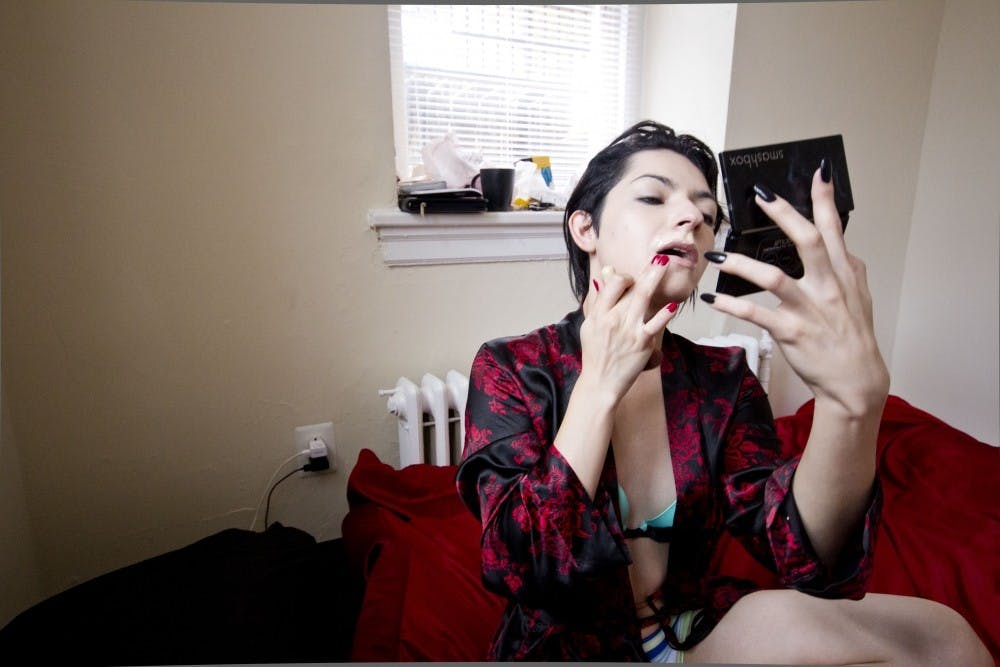Roxie* is a 34-year-old, divorced mother of two. Originally from Maryland, she moved to Philadelphia on a whim a few months ago, and quickly fell in love with the city. She has a job in the medical industry, and enjoys taking detours to South Philly and Chinatown on the weekends. The cost of living in Philadelphia can be brutal. Luckily, Roxie has a lucrative side-gig: She makes $2,000 per month as a prostitute.
It started seven months ago after she put up an advertisement online. Since then, Roxie’s had close to 100 clients. The ad quickly spread all over the internet, where men find Roxie and request her services through a variety of underground websites. She meets her clients in public places — stores or parking lots — and then they head to a hotel room or the man’s home.
For Roxie, sex work is empowering. It allows her to care for her family and live comfortably. Prostitution isn’t legal in Pennsylvania, but it should be.
You might be appalled at the notion of legal prostitution. But, it wouldn’t be unprecedented. From 2003 to 2009, the United States had an inadvertent trial run with state-sanctioned prostitution. It was accidentally legalized in Rhode Island due to a deletion of language from state law. During this six-year period, the National Bureau of Economic Research found that cases of gonorrhea decreased by 39 percent, and rape by 31 percent. Brothels have also operated legitimately in several counties in Nevada since 1971.
For Pennsylvania sex workers, prostitution can be an unforgiving business. Clients are demanding; they often disrespect sexual boundaries and refuse to use protection.
“I never understood that, why you would actually want to pay to have this high risk of getting diseases,” Roxie said. “But there’s a lot of people that ask [for] that.”
Without legal statutes in place to protect Roxie, there’s not much she can do. Customers frequently renege on their payment or offer drugs as compensation. Working in an illicit industry, Roxie can’t turn to the authorities to seek justice against her abusers. So, she gets tested for sexually transmitted diseases every three months, which she claims is about average for most girls in the industry, and gets on with her work.
“I think that if it was legal,” Roxie mused, “People would be a little safer.”
• • •
Regardless of its dangers, prostitution pays the bills.
In 2014, Jara Krys took a leave of absence from the Huntsman Program in International Studies and Business with $1,500 to her name and no support from her family. Jara was a sex worker throughout her time at Penn. But when she left, it became her full-time job.
As a transgender woman, Jara has dealt with a wide variety of clients. Men have demanded free sex, fetishized and discriminated against her for being trans, and disregarded her sexual parameters. She’s also had a variety of negative encounters with the police.
“They’ll, you know, steal your money, ask for free sex,” Jara said. “They will belittle you. And that’s not the kind of approach that you take if your main incentive for having these laws is to save people from being trafficked.”
Jara has considered filing police misconduct suits, but her legal counsel advised her against it, fearing that she could be charged with a crime in retaliation.
According to data sent to me by the Philadelphia Police Department, from August 2017 to July 2018, the authorities arrested people for soliciting sex work 651 times. Inevitably, a large number of these arrests were traumatic for the people involved, many of whom were just trying to make enough money to survive.

• • •
Barbara* has owned massage parlors in Allentown, Pa., and neighboring towns for nearly 30 years. She works as a paid companion on the side — she maintains that she does not have sex with her clients but merely keeps them company, usually for an hour or two. Some of her customers have brought her on vacations as far as Florida, and she’s made enough money to support her lifestyle.
Although Barbara also asserts that no inappropriate services are solicited at her massage parlors, she’s had numerous unpleasant dealings with the police.
“[They] will try to grab your hand forcefully and put it on their penis. I had a state trooper try to do that to me one time, but I wouldn’t touch him down there,” she said.
Pennsylvania State Police did not respond to my request for comment on Barbara’s allegations.
The responsibility of law enforcement is to ensure everyone’s safety. Yet, instead of protecting Pennsylvania’s citizens, it seems that the state police are exerting their power in inappropriate and unlawful ways.
“I’ve been doing this for over 25 years,” Barbara said. “The three times I had police come in, that’s when I felt like my life was in danger.”
Despite the harassment she encountered, Barbara actually insists that prostitution takes sex work to an unnecessary degree. Regardless, had prostitution been legal, the police would have never investigated her massage parlor. In other words, Barbara’s traumatic experience would have never occurred. The police should serve as a resource, not a liability. If prostitution were legal, sex workers could reach out to the police without legal repercussions.
“A lot of sex workers can’t actually file rape claims, because they are worried that they’ll get in trouble with the process,” Jara explained. “Rape is very common in the industry.”
“Legalizing it would make it easier for sex workers to approach policemen, if they are being trafficked,” she added.

• • •
Prostitution isn’t the career that most parents want for their children, but that doesn’t mean it should be illegal. Sex work allows women like Jara, Roxie, and Barbara to provide for themselves when nobody else can, and acquire the resources they need to start the lives they want.
Jara returned to Wharton last fall to complete her degree in entrepreneurship. After graduation, she hopes to work in the adult entertainment industry in a different capacity: by opening her own sex shop that encourages positive conversations about intercourse. Although sex work might not have been ideal, Jara is not ashamed.
“[Without sex work] I wouldn’t have been able to transition,” she said. “It’s hard to regret something when you had no other choice.”
When Jara started out as a sex worker during high school, she was terrified.
“At first it was traumatizing and it was dehumanizing,” she said. “I valued myself the way society valued sex workers which is no value. I just remember being so disgusted, going to see a client and feeling like I did something so wrong.” But Jara went on to explain that had prostitution been legal, things would’ve been different for her.

“I think I wouldn’t have let men take advantage from me when I first started, and I was taken advantage of almost every time,” she said. “Every client that I saw before I understood that it was essentially a job. So you know I wouldn’t have let that happen.”
For an industry to be outlawed, there must be a compelling state interest. Despite what you might think, sex work isn’t meaningless. It provides comfort to lonely people who long for the attention of others.
“People need to be touched,” Barbara pleaded. “There are so many lonely men out there that are willing to pay $300 dollars an hour just [for a woman’s touch].”
The police are wasting time and resources going after women that need their protection. Instead of focusing on people having consensual sex for pay, they need to crack down on the real issue: violent sex traffickers destroying the lives of women and children throughout the country, and rapists who abuse sex workers. Pa.: it’s time to legalize prostitution.
*Name has been changed.
Opinion Editor Harry Trustman contributed reporting to this column.

ISABELLA SIMONETTI is a College sophomore from New York studying English. Her email address is simonetti@thedp.com.
The Daily Pennsylvanian is an independent, student-run newspaper. Please consider making a donation to support the coverage that shapes the University. Your generosity ensures a future of strong journalism at Penn.
Donate





Most Read
Former Penn Medicine researcher Katrina Armstrong resigns from role as Columbia interim president
Fran McCaffery named new Penn men’s basketball head coach
NIH terminates three Penn research grants, citing incompatibility with ‘agency priorities’
More Like This